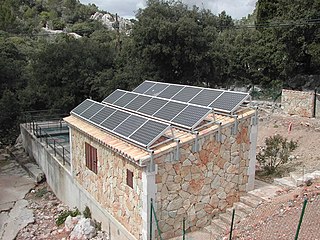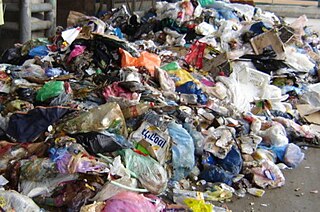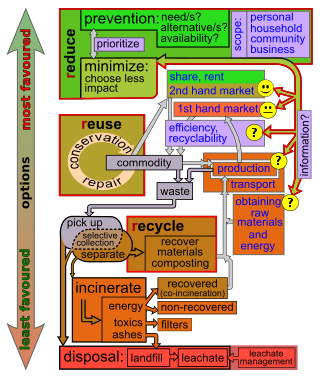
In this list List of notable waste management companies, many entries are Multinational corporations: the associated country listing is by location of Management HQ.

In this list List of notable waste management companies, many entries are Multinational corporations: the associated country listing is by location of Management HQ.

Hazardous waste is waste that must be handled properly to avoid damaging human health or the environment. Waste can be hazardous because it is toxic, reacts violently with other chemicals, or is corrosive, among other traits. As of 2022, humanity produces 300-500 million metric tons of hazardous waste annually. Some common examples are electronics, batteries, and paints. An important aspect of managing hazardous waste is safe disposal. Hazardous waste can be stored in hazardous waste landfills, burned, or recycled into something new. Managing hazardous waste is important to achieve worldwide sustainability. Hazardous waste is regulated on national scale by national governments as well as on an international scale by the United Nations (UN) and international treaties.

Waste management or waste disposal includes the processes and actions required to manage waste from its inception to its final disposal. This includes the collection, transport, treatment, and disposal of waste, together with monitoring and regulation of the waste management process and waste-related laws, technologies, and economic mechanisms.

Industrial waste is the waste produced by industrial activity which includes any material that is rendered useless during a manufacturing process such as that of factories, mills, and mining operations. Types of industrial waste include dirt and gravel, masonry and concrete, scrap metal, oil, solvents, chemicals, scrap lumber, even vegetable matter from restaurants. Industrial waste may be solid, semi-solid or liquid in form. It may be hazardous waste or non-hazardous waste. Industrial waste may pollute the nearby soil or adjacent water bodies, and can contaminate groundwater, lakes, streams, rivers or coastal waters. Industrial waste is often mixed into municipal waste, making accurate assessments difficult. An estimate for the US goes as high as 7.6 billion tons of industrial waste produced annually, as of 2017. Most countries have enacted legislation to deal with the problem of industrial waste, but strictness and compliance regimes vary. Enforcement is always an issue.

Environment friendly processes, or environmental-friendly processes, are sustainability and marketing terms referring to goods and services, laws, guidelines and policies that claim reduced, minimal, or no harm upon ecosystems or the environment.

Zero waste, or waste minimization, is a set of principles focused on waste prevention that encourages redesigning resource life cycles so that all products are repurposed and/or reused. The goal of the movement is to avoid sending trash to landfills, incinerators, oceans, or any other part of the environment. Currently 9% of global plastic is recycled. In a zero waste system, all materials are reused until the optimum level of consumption is reached.
Articles related to waste management include:

Municipal solid waste (MSW), commonly known as trash or garbage in the United States and rubbish in Britain, is a waste type consisting of everyday items that are discarded by the public. "Garbage" can also refer specifically to food waste, as in a garbage disposal; the two are sometimes collected separately. In the European Union, the semantic definition is 'mixed municipal waste,' given waste code 20 03 01 in the European Waste Catalog. Although the waste may originate from a number of sources that has nothing to do with a municipality, the traditional role of municipalities in collecting and managing these kinds of waste have produced the particular etymology 'municipal.'

Waste Management, Inc., doing business as WM, is a waste management, comprehensive waste, and environmental services company operating in North America. Founded in 1968, the company is headquartered in the Bank of America Tower in Houston, Texas.

Pennon Group plc is a British water utility company based in Exeter, England. The company is listed on the London Stock Exchange and is a constituent of the FTSE 250 Index. 83% of the company's profits come from its subsidiary, South West Water.

Waste minimisation is a set of processes and practices intended to reduce the amount of waste produced. By reducing or eliminating the generation of harmful and persistent wastes, waste minimisation supports efforts to promote a more sustainable society. Waste minimisation involves redesigning products and processes and/or changing societal patterns of consumption and production.

A waste picker is a person who salvages reusable or recyclable materials thrown away by others to sell or for personal consumption. There are millions of waste pickers worldwide, predominantly in developing countries, but increasingly in post-industrial countries as well.

Construction waste or debris is any kind of debris from the construction process. Different government agencies have clear definitions. For example, the United States Environmental Protection Agency EPA defines construction and demolition materials as “debris generated during the construction, renovation and demolition of buildings, roads, and bridges.” Additionally, the EPA has categorized Construction and Demolition (C&D) waste into three categories: non-dangerous, hazardous, and semi-hazardous.

Biffa Limited is a waste management company headquartered in High Wycombe, England. It provides collection, landfill, recycling and special waste services to local authorities and industrial and commercial clients in the United Kingdom. As of 2017, it was the UK's second-largest waste-management company.
SA Waste Holdings (Pty) Ltd is a waste management company, based in Johannesburg, South Africa, in Gauteng Province. It was launched in 1990, and as of 2003 boasted 626 staff members. The company boasts clients in the retail, commercial, entertainment and gambling sectors. SA Waste is a BEE conscious company, and has a Black Economic Empowerment (BEE) subsidiary, Kofifi Thusano (Pty) Ltd.

Biomedical waste or hospital waste is any kind of waste containing infectious materials generated during the treatment of humans or animals as well as during research involving biologics. It may also include waste associated with the generation of biomedical waste that visually appears to be of medical or laboratory origin, as well research laboratory waste containing biomolecules or organisms that are mainly restricted from environmental release. As detailed below, discarded sharps are considered biomedical waste whether they are contaminated or not, due to the possibility of being contaminated with blood and their propensity to cause injury when not properly contained and disposed. Biomedical waste is a type of biowaste.

Armenia is underdeveloped in its waste management and recycling activities.

Waste are unwanted or unusable materials. Waste is any substance discarded after primary use, or is worthless, defective and of no use. A by-product, by contrast is a joint product of relatively minor economic value. A waste product may become a by-product, joint product or resource through an invention that raises a waste product's value above zero.
There are various issues of waste management in Thailand, including excessive plastic use, industrial waste, among others.